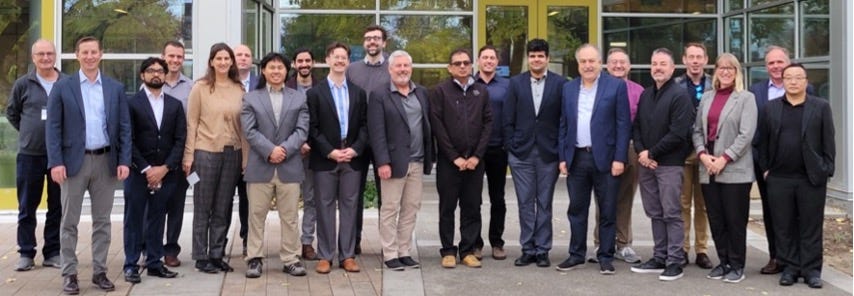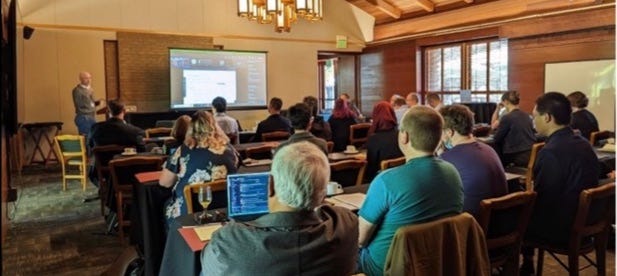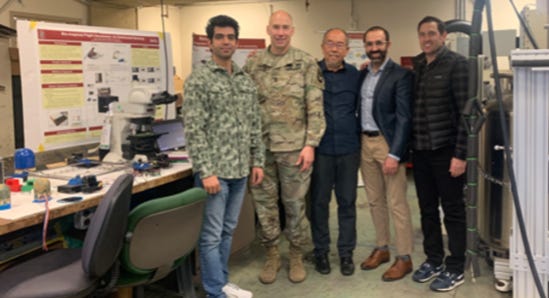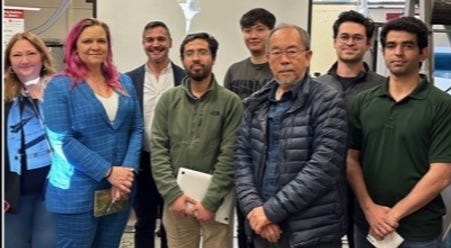Happy New Year from Technology Transfer for Defense (TT4D) at Stanford University (and the H4D team)
An Annual Review
We are excited to share the latest developments from the Hacking for Defense (H4D) Initiative, now rebranded as Technology Transfer for Defense (TT4D), in our annual review. TT4D continues to play a pivotal role in bridging the gap between academic technologies and the marketplace, contributing to the integration of cutting-edge technologies into defense capabilities. As we reflect on the past year's challenges and successes, we are excited to present key events, visits, and new research projects that have defined 2023.
This year has been marked by noteworthy achievements in our H4D course, impactful research projects, and the establishment of new research alliances. In our five-year journey, we have successfully implemented numerous go-to-defense market strategies, facilitating the transition of university technologies and commercial products to the Department of Defense (DoD). This effort has resulted in the incorporation of more than a dozen companies, securing lucrative DoD contracts and actively contributing to addressing critical national security challenges. The lessons learned from these experiences have provided invaluable insights into the distinguishing factors between defense marketplace successes and failures.
We invite you to delve into the exciting developments within the TT4D initiative and explore the impactful endeavors of our colleagues. As we gear up for the next chapter, we look forward to sharing more success stories and staying connected with you.
Best wishes,
Jeffrey Decker, PhD
TT4D Program Managing Director and H4D Course Co-Instructor
Precourt Institute for Energy, Stanford University
Featured TT4D Program Projects
Next-Gen AI Accelerators for Spatially Aware Autonomous Naval Systems
In response to the demand for more powerful computing systems in AI applications, Dr. Mitra and his team are developing edge AI accelerators. These accelerators aim to overcome the memory wall challenge faced by conventional approaches, particularly as AI applications move to remote edge devices. By leveraging on-chip non-volatile memory technologies like RRAM, the main goal is to provide 10-100× system-level Energy-Delay Product benefits over current commercial hardware, addressing the Navy's needs for enhanced capabilities in unmanned vehicles, advanced manufacturing, robotics, and smart cameras.
(PI: Prof. Subhasish Mitra, Dept: Electrical Engineering/Computer Science, Sponsor: USN ONR NEPTUNE Program)
Nano Ceramic Additive Manufacturing of IR Sensor Domes
Additive manufacturing has transformative potential for naval applications, offering rapid prototyping and on-site fabrication. Dr. Gu’s project focuses on using a particle ink-laser melting (PILM) additive manufacturing system to produce ceramic IR sensor domes. This addresses challenges in manufacturing structural and optical materials that can withstand hypersonic flight conditions. PILM minimizes post-processing steps, using nanoscale ceramic particles to achieve lower melting temperatures and high sintering propensity. The IR domes will undergo evaluation for optical performance and mechanical properties.
(PI: Prof. Wendy Gu, Dept: Mechanical Engineering, Sponsor: USN ONR NEPTUNE Program)
H4D Course (MS &E 297)
Hacking for Defense (H4D) is a college/university course founded in 2016 and is now taught at more than 70 colleges and universities worldwide and on three continents. The course has had more than 2,000 students through the program, all working towards solving defense and intelligence problems. Nationwide, the course has validated more than 520 defense and intelligence problems, of which 312 have been adopted by the defense sponsor. More than 25 different branches of the government sponsor the course problems. The program has been so successful that it has had 18 of its solutions funded by the government and created 53 startup companies.
At Stanford University, the original home of the H4D course, the class has worked with 48 teams from across Defense and Intelligence communities and its students have conducted more than 7,000 interviews with Defense Department stakeholders, which has incubated 15 companies now working in the Defense Market. These companies that have come out of the Stanford H4D program have raised more than $250 million in venture capital and are founded by the next generation of American business leaders.
Featured Events
1. ONR NEPTUNE Review Meeting, November 14-15, 2023
The Office of Naval Research (ONR) hosted the 2023 ONR Navy NEPTUNE Program Review Meeting at UC Davis on November 14-15, 2022. The Naval Enterprise Partnership Teaming with Universities for National Entrepreneurship (NEPTUNE) Program aligns university research with the National Defense Strategy (NDS) and establishes entrepreneurial practices to accelerate delivery of university-derived technologies and products to the defense and commercial sectors. This year's meeting saw active participation, with 31 Principal Investigators (PIs) in attendance, accompanied by their research teams. The event provided a platform for these PIs to showcase their research progress to the NEPTUNE community and engage with the NEPTUNE Program Manager.
2. Army Research Lab and Defense Innovation Unit Visit to Stanford, September 19-20, 2023
The Army Research Lab visited Stanford to establish collaboration for energy research with the Precourt Institute for Energy, the Doerr School of Sustainability, and SLAC.The Army Delegation, including Mr. Joseph Alexander, Deputy Director, Army Research Directorate, Dr. Greg Brill, Lead, Transitions, Outreach, and Technology Protection Office, and Mr. Morris Berman, Associate Division Chief, Energy Sciences, explored Stanford energy research on Sept 19-20, 2023. Two seminars delivered by the Army and DIU regarding the Energy and Power Challenges for the Army and Department of Defense.
3. Hybrid Human-Technology Intelligence Research Symposium, June 12-14, 2023
"Hybrid Human-Machine Intelligence," was hosted by Stanford University in collaboration with DEVCOM Army Research Laboratory from June 12 to 14, 2023, at the Stanford University Faculty Club. The symposium served as a unique platform for thought leaders from academia, industry, and the Department of Defense to converge on the topic of integrating artificial intelligence and machine learning with advances in neuroscience and behavioral science. The shared insights and collaborative spirit displayed during the event undoubtedly contribute to shaping the future of hybrid technologies.
4. DEVCOM ARL Soldier Center's Command Sgt. Maj. Bryan D. Barker’s Visit to Stanford Research Labs, April 5, 2023)
Command Sgt. Maj. Bryan D. Barker and Dr. Peter Khooshabeh visited Precourt research labs to include Prof. Subhasish Mitra’s lab at Computer Science and Prof. Fu-Kuo Chang’s lab at Aero/Astro. Discussions covered digital systems, nano-systems, brain-computer interfacing technologies, multi-functional energy storage composite materials, and intelligent structures.
5. ONR Science Advisor to Commander, Rebecca Boxerman’s Visit to Stanford Labs, February 13, 2023
ONR Science Advisor Rebecca Boxerman and Dr. Javier Omar Garcia, branch chief of US DEVCOM Army Research Laboratory, visited Precourt’s research labs. Their tour included Prof. Subhasish Mitra’s lab, Prof. Fu-Kuo Chang’s lab, and Wendy Gu’s lab at Mechanical Engineering, focusing on nanoscale hybrid materials, optical nanomaterials, and 3D printing of nano-architected composites. Following this visit, Prof. Fu-Kuo Chang’s lab received a Navy award for their project now entitled “Enabling Intelligent, Robust Light-Weight Structural Batteries for Vertical Takeoff and Landing/ Unmanned Aerial Vehicles (VTOL/UAM)”.
Publications
Hacking 4 Defense -A guide to Solving National Security Problems, Jeff Decker, 2023 (e-book)
For Replicator to Succeed, the Government Must Stay out of the Production Business, Jeff Decker and Noah Sheinbaum, Breaking Defense, September 19, 2023
How Software Companies Can Enter the U.S. Defense Market, Jeff Decker and Eric Li, Harvard Business Review, July 14, 2023
Blog
ONR Science Advisor and DEVCOM Soldier Center Visit Stanford Research Labs and Hacking for Defense Program, May 4, 2023
TT4D Program Team
Prof. Fu-Kuo Chang, Faculty Director
Dr. Jeff Decker, Program Director
Dr. Nilay Papila, Sr. Program Manager










